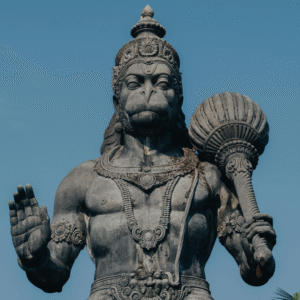
Fearless Love and Steady Devotion: Exploring Verses 17–18 of the Hanuman Chalisa
As we continue our sacred journey through the Hanuman Chalisa, verses 17 and 18 shine a light on Hanuman’s immeasurable power and the loving surrender he inspires. These verses not only describe Hanuman’s celestial capabilities, but also remind us of the blessings that arise when we anchor our lives in service, devotion, and remembrance of the Divine.
Verse 17
Nase rog hare sab peera, japat nirantar Hanumat beera
All afflictions and ailments are removed, and all suffering is soothed, by the constant remembrance of brave Hanuman.
This verse reminds us of the healing power of faith. Hanuman is not only a divine protector, but also a source of deep comfort for those who call upon him with sincerity. Here, “rog” (disease) and “peera” (pain) refer not only to physical suffering, but also emotional and spiritual turmoil. Through the practice of repetition—”japat nirantar” (unceasing chanting or remembrance)—devotees invoke Hanuman’s presence in their hearts and lives, allowing his energy to bring peace and restoration.
This verse asks us: What does it look like to truly remember the Divine with constancy? Hanuman becomes a mirror for that kind of loving, fearless presence we can return to again and again.
Verse 18
Sankat se Hanuman chudavai, man kram bachan dhyan jo lavai
Hanuman delivers from every crisis those who remember him with heart, word, and action.
If verse 17 speaks of healing, verse 18 speaks of liberation. The word “sankat” refers to crises, challenges, or calamities—the hard moments we all face. Hanuman is not just a symbol of inner strength, but an active force of protection and release for those who sincerely turn toward him.
But there’s a deeper layer here: this verse highlights integrated devotion. We are reminded to bring Hanuman into our mind (man), action (kram), and speech (bachan). Devotion is not something reserved for sacred moments or rituals—it is something we live. When we align our thoughts, words, and actions with remembrance and love, we invite Hanuman’s presence to transform our lives from the inside out.
Living the Verses
Together, these two verses offer a profound teaching: that healing and protection are not passive gifts, but the fruits of a relationship rooted in sincere, embodied devotion. Hanuman doesn’t ask us for perfection—he invites us to remember, to serve, and to surrender.
In times of trouble, we may find ourselves grasping for control or answers. These verses offer a different path: turn inward with faith, call upon Hanuman with love, and act in alignment with that remembrance. As Neem Karoli Baba often reminded us, the Name itself has power. Let our lives be filled with that sacred remembering.
Reflections for the Heart
- What does it mean to remember with mind, word, and action?
- How do I invite divine presence into my daily life?
- In moments of pain or difficulty, can I soften into trust?
May these verses be a balm for your heart and a guide for your practice.
Jai Hanuman! Jai Maharaj-ji!
